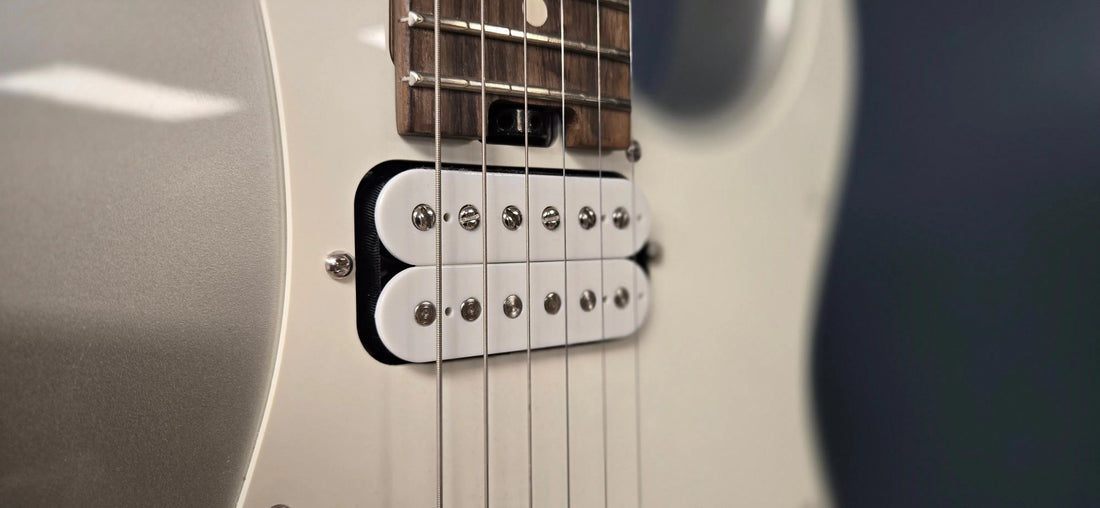What Are Humbuckers, and Why Do They Matter?

Share
For guitar enthusiasts, the term "humbucker" often comes up when discussing tone, sound quality, and gear preferences. But what exactly is a humbucker, and why has it become such a cornerstone of guitar design and sound? Let’s explore the history, functionality, and impact of humbuckers in the world of music.
What Is a Humbucker?
A humbucker is a type of electric guitar pickup designed to "buck" or cancel out the hum and noise typically associated with single-coil pickups. Invented in the mid-20th century, humbuckers use two coils wired in opposite polarity to reduce electromagnetic interference. This design results in a cleaner, more powerful signal that’s free from the 60-cycle hum caused by electrical sources like lighting or amplifiers.
Unlike single-coil pickups, which are known for their bright and crisp sound, humbuckers deliver a warmer, fuller tone with enhanced midrange and bass response. Their unique construction and tonal characteristics make them a versatile choice for a wide range of musical genres, from jazz and blues to hard rock and metal.
How Do Humbuckers Work?
Humbuckers consist of two coils of wire wrapped around a magnetic core, usually made from Alnico or ceramic materials. The key to their noise-canceling properties lies in the coils' opposite polarity and reverse winding. When electromagnetic interference reaches the pickup, the hum is canceled out because the noise in one coil is negated by the opposite signal in the other. However, the vibrations of the guitar strings—which create the actual sound—are unaffected, resulting in a clean and powerful output.
Why Do Humbuckers Matter?
Humbuckers have become a staple in guitar design due to their distinct advantages:
- Noise Reduction: The primary reason for their invention, humbuckers eliminate the annoying hum that plagued early electric guitars, making them ideal for live performances and studio recordings.
- Fuller Tone: Humbuckers produce a thicker, richer sound with pronounced lows and mids, making them perfect for genres that demand a powerful, commanding tone.
- Versatility: Their tonal range makes them suitable for everything from smooth jazz to aggressive metal. Guitarists can achieve warm, clean sounds or heavy, distorted tones simply by adjusting their setup.
- Enhanced Sustain: Humbuckers provide more output than single-coils, allowing for greater sustain and dynamics, which are essential for expressive lead playing.
Humbuckers in Action
Many iconic guitarists and bands have relied on humbuckers to define their sound. For example, the Gibson Les Paul’s classic "PAF" (Patent Applied For) humbuckers contributed to the rich, creamy tones of legends like Jimmy Page and Slash. Similarly, modern humbuckers like Seymour Duncan’s JB model or EMG’s active pickups have become staples for hard rock and metal players seeking high output and clarity.
Choosing the Right Humbucker
When selecting a humbucker, consider your musical style and tonal preferences. Passive humbuckers, like the Seymour Duncan ‘59 or DiMarzio Super Distortion, are great for dynamic, expressive playing. Active humbuckers, such as EMG’s 81/85 set, offer higher output and are ideal for high-gain genres.
Conclusion
Humbuckers matter because they revolutionized the electric guitar, offering a clean, powerful sound that suits a wide range of musical applications. Whether you’re looking to eliminate noise, achieve a fuller tone, or explore new sonic possibilities, humbuckers are an essential tool in any guitarist’s arsenal. Understanding their unique features and benefits can help you choose the perfect pickup to elevate your playing to the ne
